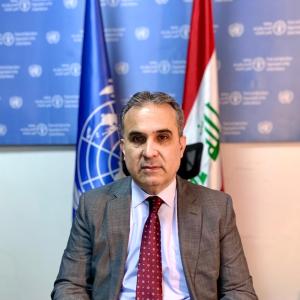Training of Agriculture extension staff on the implementation of Farmer Field Schools (FFS) In Basra Governorate
12 October 2022
Basra, Iraq, 10 October 2022 - The Food and Agriculture Organization of The United Nations (FAO) in Iraq launched a 5-day training for agriculture extension staff to facilitate the implementation of “Farmer Field Schools” (FFS) in Basra, ThiQar and Missan Governorates. In total, 25 people participated, including 6 women.
The training is part of the “Restoration and Strengthening the Resilience of Agri-Food Systems Project in Southern Iraq” project, funded by the European Union and implemented by FAO-Iraq in cooperation with the Ministry of Agriculture in Iraq. The FFS approach is the methodology to work closely with farmers to jointly analyse their production system, identify problems, test solutions, and adopt practices that are most appropriate for their farming systems in the field.
FAO Iraq representative Dr. Salah El-Hajj Hassan said “The FFS training approach is a hands-on learning process to promote modern, sustainable and good agricultural practices of farmers that will improve their income. FAO Iraq is working to strengthen the agricultural sector in Iraq and to create job opportunities to the rural families thanks to the European Union financial support. This project is part of a larger EU-funded “Agri-food Business Development Program” that is implemented together with other international partners and focuses fully on job creation in the agricultural sector.

He started his career in 1984, as Senior Research Assistant in the Agricultural Research and Education Centre (AREC), American University of Beirut. From 1987 to 1991, he was Coordinator of the Student Training Programme, and also Agriculture and Horticultural Teacher for the Faculty of Agriculture, at the Lebanese University.
From 1991 to 1995, he worked as Agricultural Engineer at the Ministry of Agriculture, Bekaa Regional Office, Zahlah and was then assigned to the Agricultural Research Institute in the Tal Amara station, first as Head of the Crop Production Department and subsequently in charge of the Plant Protection Laboratory. From 2002 to 2006, he was Director of the Kfardane Research Station (Agricultural Research Institute). In 2008, he became Visiting Scientist at the International Maize and Wheat Improvement Centre (CIMMYT) and Coordinator of a project with the International Centre for Atomic Energy Agency, Vienna.
In 2010, he served as Advisor to the Minister for Agriculture of Lebanon. In 2011, he became President of the Pesticide Scientific Committee, Head of the Phytoplasma Committee and Director of the Agriculture and Rural Development Programme (ARDP) (EU-funded project). From 2010 to 2013, he represented Lebanon in negotiations with EU, Egypt, Jordan and Iraq. During his career, Mr Hajj Hassan also carried out a number of other functions. He represented the Lebanese Agricultural Research Institute (LARI) in several research programmes with the International Centre for Agricultural Research in the Dry Areas (ICARDA) and the American University of Beirut. He was Coordinator of the Mashreq/Maghreb project with ICARDA, representing Lebanon in the Steering Committee, as well as being the Head of the Sugar-beet Delivery and of the Wheat Delivery Committees. For a number of years, Mr Hajj Hassan worked for the preparation of FAO TCP projects and served as the National Director of a TCP project. He joined FAO in January 2014 as FAO Representative in Yemen. Mr Hajj Hassan succeeds Mr El Zubi as FAO Representative in Iraq.


